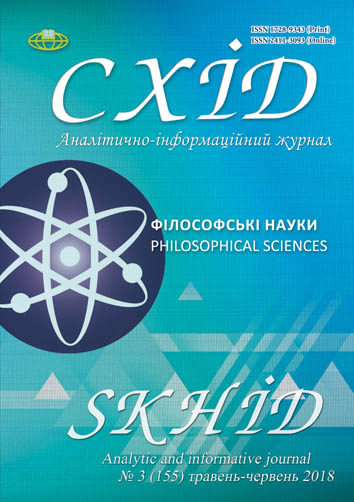The Pentecostal teaching about a baptism with the Holy Spirit
DOI:
https://doi.org/10.21847/1728-9343.2018.3(155).139411Keywords:
a baptism with the Holy Spirit, Pentecostal teaching, evangelical Hermeneutics, modern evangelical theologyAbstract
The article is devoted to the study of the Pentecostal teaching about the baptism with the Holy Spirit as an important theological and hermeneutical problem. Christian theology distinguishes baptism as one of the main problems requiring a thorough theological and hermeneutic study. From the very beginning of the modern Pentecostal movement, his representatives emphasized that all Christians may and need experience of baptism with the Holy Spirit which differs from the experience of the birth from above and follows Him. Such an understanding of the sequence or step by step naturally follows from the belief that the presenting of the Holy Spirit on the Day of Pentecost, described by Luke in the Acts of the Apostles (second chapter), as sources of power for effective testimony, and not as a condition of the New Testament being. It is proved that, despite the lack of a single theological view of the charismatic component in Luke's pneumatology, Pentecostal theologians consolidate the conviction that those who received baptism in the Holy Spirit received power. A conclusion based on the hermeneutic analysis was made that, according to God's plan, the baptorus was to participate in the universal evangelical mission of the Christian Church (Acts 1: 8). With this power came the courage in the testimony (Acts 4:31), the guidance in the missions performed (Acts 16: 6-10), and in some cases (despite the disagreement of some theologians) the ability to heal diseases and banish demons and even the right to judge (Acts 13: 9-11). It was analyzed that Pentecostal theology did not differentiate the experience of baptism with the Holy Spirit from conversion, did not confirm the normative value of the New Testament narratives, allowing Luke's texts to exist independently and at the same time to complement the pneumatology of Paul and John, testifying the diversity of the work of the Holy Spirit in people and communities.Downloads
References
Bible Doctrines - Foundation of the Church. 1984. Hazelwood, Mo.: Pentecostal Publishing House.
Bruner, F.D. 1970. ATheology of the Holy Spirit: The Pentecostal Experience and the New Testament Witness.Grand Rapids: Wm. B. Eerdmans.
Dunn, J. 2017. Baptism in the Holy Spirit. Modern Pentecostalism in the light of the New Testament doctrine [translat.]. Colloquium. Cherkasy, 260 р. (rus).
Fee, G. 1991. Gospel and Spirit: Issues and New Testament Hermeneutics. Hendrickson.Peabody,Mass.
Fee, G., Stuart, D. 2009. How to read the Bible and see all of its value? / Transl. from English by V.Gavrilova. Shandal Saint Petersburg (rus).
Grider, K.J. 1980. Entire Sanctification: The Distinctive Doctrine of Wesleyanism. Beacon Hill,Kansas City,Mo.
Menzies, U., Menzies, R. 2017. Spirit and Power. Fundamentals of Pentecostal experience [translat]. МТI (Моskow); Аgape (Nizhny Novgorod), 526 р. (rus).
Minutes of the 44th Session of the General Council of the Assemblies of God with Revised Constitution and Bylaws. 1991. The General Council of the Assemblies of God.Springfield,Mo.
Stott, D. 1998. Acts of the Apostles. Мirt.Saint Petersburg, 603 р. (rus).
Stott, J.R.W. 1964. The Baptism аnd Fullness оf the Holy Spirit. Downers Grove, I11.: InterVarsity.
Thematic program of the BibleSchoolon the Doctrine of the CCCFE. 2002. The Word of a Christian. Vinnytsia, 448 р. (rus).
Wyckoff, D. 1999. Baptism in the Holy Spirit. Systematic theology / ed. S. Horton. Transl. from English. Кyiv: Life: 559-605. (rus).
Downloads
Published
How to Cite
Issue
Section
License
Copyright (c) 2018 Mykhaylo Mokiyenko

This work is licensed under a Creative Commons Attribution-NonCommercial-NoDerivatives 4.0 International License.
1. Authors bear responsibility for the accuracy of facts, quotations, numbers and names used.
2. Manuscripts are not sent back.
3. The publisher does not always agree with the authors' opinion.
4. The authors reserve the right to authorship of the work and pass the first publication right of this work to the journal under the terms of a Creative Commons Attribution-NonCommercial-NoDerivatives 4.0 International License. This license allows others to distribute (copy) the published work for non-commercial purposes, provided there is mandatory attribution to its authors and a link to the first publication in our journal.
5. The authors have the right to conclude separate supplement agreements that relate to non-exclusive work distribution in the form in which it has been published by the journal (for example, to upload the work to the online storage of the journal or publish it as part of a monograph), provided that the reference to the first publication of the work in this journal is included.

